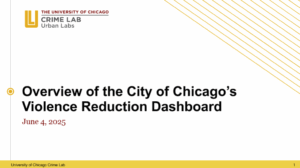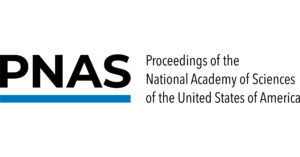Community Violence Intervention
Supporting Enlace Chicago and New Life Centers with Data-Driven Proactive Outreach

Using a data-driven approach, the Crime Lab provides individual referrals to help outreach organizations Enlace Chicago and New Life Centers target their services to people who may be at the highest risk for gun violence involvement in the near future.
Challenge
Historically, due to lack of data and capacity constraints, community-based organizations were only able to provide services to residents after a violent incident had already occurred and could only serve those who were already known to outreach workers or who had signed up for services on their own. This approach made it difficult to effectively prevent gun violence before it occurred because they couldn’t reach people who needed support but who hadn’t yet connected to services.
Opportunity
The Crime Lab’s Service Provision Risk Assessment (SPRA) uses data to understand who may be at the highest risk of gun violence involvement in the community area of Little Village. With this information in hand, outreach workers at Enlace Chicago and New Life Center, two local nonprofits with deep ties to community residents and a long history of anti-violence services in the area, can then engage in proactive outreach to connect identified people to services prior to an incident occurring.
Project overview
The Crime Lab has partnered with two community-based organizations committed to reducing violence in Little Village—Enlace Chicago and New Life Centers. Little Village is a well-populated, predominantly Latinx community with a rich tradition of local activism and business development that has experienced a disproportionate share of gun violence. For decades, Enlace and New Life have worked together to serve youth and adults in Little Village most impacted by gun violence, collaborating with community partners and local police to interrupt and de-escalate violence, coordinate rapid responses when serious violence occurs, and deliver intensive services that combine street outreach, trauma-informed mental health services, educational supports, and sports programming.
However, Enlace and New Life have historically only been able to provide services to residents after a violent incident has already occurred and could only serve those who are already known to outreach workers or who had signed up for services on their own. This meant that a crucial group—people who were at risk of violence involvement but hadn’t yet been connected to services—were out of reach.
The Crime Lab’s Service Provision Risk Assessment (SPRA), originally developed for the READI Chicago community violence intervention program, uses a data-driven approach to help organizations prioritize services for those who are most at risk of gun violence involvement in the near future. This referral pathway complements Enlace and New Life’s deep expertise and on-the-ground knowledge with Chicago Police Department data to enhance the organizations’ ability to identify, engage, and serve Little Village residents who would benefit most from their programming.
Since May 2020, 501 people have been referred for services to Enlace and New Life Centers using the SPRA. The SPRA referral pathway is both informed by, and serves as a complement to, each organization’s traditional outreach and referral strategies. Enlace and New Life have also worked with the Crime Lab to ensure that referrals respect individual privacy while providing useful information to community violence workers trying to reduce gun violence in their neighborhoods.
Years Active
2020 – 2023
Project Leads
Brenda Benitez
Senior Implementation Manager

Monica Bhatt
Senior Research Director


Webinar: Overview of the City of Chicago’s Violence Reduction Dashboard
The Crime Lab hosted a webinar that explored the City of Chicago’s Violence Reduction Dashboard—a publicly available tool launched to support efforts to reduce gun violence through transparent, real-time data.

Unforgiving Places: The Unexpected Origins of American Gun Violence
Crime Lab Pritzker Director Jens Ludwig authored a book that argues the lack of progress in reducing gun violence ultimately stems from our having misunderstood the nature of the problem, and that behavioral science gives us a new way to understand – and solve – gun violence in America.

Local Gun Violence Dashboards
Chicago’s Violence Reduction Dashboard, launched by the Crime Lab in 2021, is featured in a toolkit created by Everytown for Gun Safety Support Fund as a part of its Gun Violence Data Fellowship.

Valuing the benefits of reducing firearm violence in the United States
This paper estimates the monetized value of the impact of reducing firearm violence and how that value is distributed across the population.
